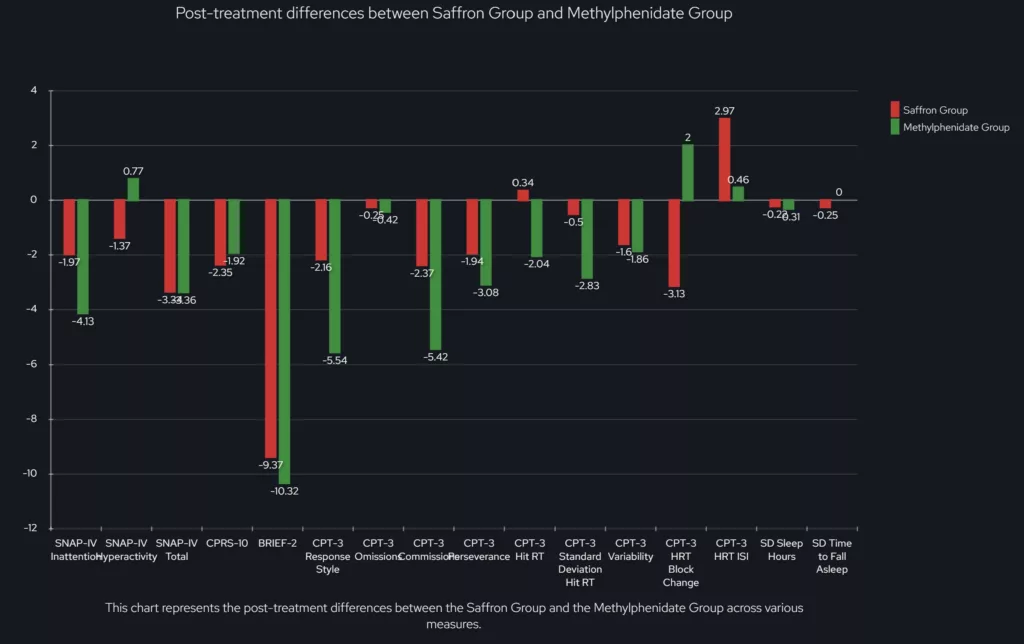What is Saffron Extract?
Saffron, a spice derived from the flower of Crocus sativus, is often hailed as the world’s most expensive spice. It’s not just a culinary favorite; it also boasts a history rich in medicinal use. But when we talk about saffron extract for ADHD, we’re delving into a whole new level of potential health benefits for this neurological disorder.
Saffron extract is a concentrated form of the spice, typically prepared by drying and grinding the saffron threads. This extraction process concentrates the beneficial compounds found in the spice, amplifying its potential impact.
Beneficial Compounds in Saffron Extract
What makes saffron extract so special? It’s packed with powerful compounds such as crocin, crocetin, safranal, and picrocrocin. These compounds are known for their antioxidant, anti-inflammatory, and neuroprotective properties.
Let’s dive a bit deeper and explore these potent compounds in saffron, shall we?
| Compound | Benefits |
|---|---|
| Crocin | Known for its antioxidant properties, crocin fights against free radicals and oxidative stress in the body. It’s a key player in keeping our cells healthy and efficient. |
| Crocetin | An anti-inflammatory dynamo, crocetin helps to keep inflammation at bay. This aids in managing symptoms of various diseases and conditions, including ADHD. |
| Safranal | Safranal packs a punch with its neuroprotective qualities. It helps protect the neurons in our brain, which is crucial for cognitive functions such as focus and memory. |
| Picrocrocin | Picrocrocin is another antioxidant hero in this lineup. It’s also believed to have antidepressant properties, making it a potentially valuable ally in managing mood disorders often associated with ADHD. |
How is Saffron Extract Made?
The process of making saffron extract is painstakingly meticulous. It starts with harvesting the saffron threads by hand from the flower. These threads are then dried and ground into a fine powder to create the extract.
The History of Saffron Extract in Medicine
Ever wondered about the history of saffron extract in medicine? Well, you’re in for a fascinating tale. Prepare for a journey back in time that starts more than 3,500 years ago.
The use of saffron in medicine can be traced back to ancient Egypt. It was prized by Pharaohs for its medicinal properties, including as a treatment for gastrointestinal disorders. Fast-forward to the Middle Ages and saffron was noted in several medical texts for its therapeutic capabilities.
But wait, there’s more! In the 19th century, saffron started gaining recognition in psychiatric treatment. Physicians used it to help improve mood and reduce anxiety. Yes, you read that right. Even back then, saffron’s potential in treating mental health conditions was being explored.
Understanding How Saffron Extract Works to Treat ADHD
Saffron extract’s major power play in treating ADHD lies in its impact on the brain’s neurotransmitters. These chemical messengers play a crucial role in attention and behavior. Key among them is dopamine, a neurotransmitter often found in lower levels in individuals with ADHD.
Saffron appears to act much like ADHD medications, increasing dopamine levels in the brain. This results in better focus, less impulsivity, and improved mood – a trifecta of benefits for those dealing with ADHD.
Equating Saffron to ADHD Medication
Intriguingly, studies have started to compare saffron extract to conventional ADHD medications. One notable study found that saffron was just as effective as methylphenidate, a commonly used ADHD medication, in managing symptoms. Though more research is needed to solidify saffron’s standing as an ADHD treatment, these findings are promising.
Traditional ADHD Treatments vs. Saffron Extract
ADHD, or Attention Deficit/Hyperactivity Disorder, is a widespread neurodevelopmental disorder affecting individuals globally. Its symptoms typically manifest as hyperactivity, inattention, and impulsivity. Conventional treatment often involves medication, therapy, and education. However, the potential side effects of ADHD medications have led to an increased interest in alternative treatments like neurofeedback, therapeutic video games, and nutritional supplements.
Saffron, a natural remedy known for its anti-inflammatory and antioxidant properties, has emerged as a promising alternative. It has been used historically for managing chronic illnesses like rheumatoid arthritis, inflammatory bowel diseases, Alzheimer’s, and various cancers. Saffron also appears to protect the central nervous system and stimulate the secretion of dopamine, serotonin, and noradrenaline – neurotransmitters closely linked with ADHD.

While research into saffron’s role in ADHD treatment is still nascent, early results are encouraging, suggesting that saffron might be an effective supplement or alternative to traditional ADHD medications.
Previous research has often overlooked two crucial aspects: executive function – the mental skills needed for planning, focusing, and multitasking – and sleep quality. With about half of children and adolescents with ADHD struggling with executive functioning and many experiencing sleep disturbances, saffron, known to enhance sleep quality, could offer significant benefits.
A recent non-randomized study compared the effectiveness of a specific saffron product, Saffr’activ®, with the commonly used ADHD medication, methylphenidate. The study used objective measures and subjective psychometric scales to assess both core ADHD symptoms and executive functions.
The hypothesis
The study hypothesized that saffron could be as effective as methylphenidate in managing ADHD symptoms and enhancing executive functioning. If this hypothesis is confirmed, it could lead to a natural, potentially safer alternative for managing ADHD symptoms.
The results of the study were intriguing, suggesting that saffron and methylphenidate could have similar positive effects on managing ADHD symptoms. This finding aligns with previous clinical trials, which found that saffron extract could effectively and safely help manage ADHD symptoms.
The study found no significant differences between saffron and methylphenidate in managing ADHD symptoms. However, each had a slightly different impact – methylphenidate had a stronger effect on inattention, while saffron was more effective for hyperactivity.
Beyond managing ADHD symptoms, saffron also improved executive functions – skills such as multitasking, inhibition, working memory, and action monitoring, which are often challenged in individuals with ADHD. This finding offers a more comprehensive solution for ADHD management and sparks hope for future research.
Saffron Extract Dosages: What You Need to Know
When it comes to saffron extract dosages for ADHD, it’s crucial to bear in mind that what works for one person might not work for another. That being said, research has suggested a general guideline to follow.
Studies have shown that saffron extract can be beneficial in treating ADHD symptoms at doses of around 20-30mg per day. This range is often split into two equal doses taken in the morning and evening.
Note: It’s always recommended to consult with a healthcare professional before starting any new supplement regimen, especially for those already taking medication for ADHD.
As for the duration of treatment, studies have generally examined the effects of saffron extract over a period of 6 weeks. Results indicated significant improvements in ADHD symptoms over this time frame.
| Dosage | Frequency | Duration |
|---|---|---|
| 20-30mg | Twice daily | 6 weeks |
However, more research is needed to confirm the optimal dosage and treatment duration for saffron extract as an ADHD remedy. It’s also worth noting that the effectiveness of saffron extract may vary depending on the severity of an individual’s ADHD symptoms.
As a final reminder, always consult your healthcare provider to determine if saffron extract is a suitable treatment option for you or your child’s ADHD.
Common Side Effects of Saffron Extract
Like most substances, saffron extract is not without its side effects. Although generally considered safe for consumption, certain individuals might experience certain discomforts or adverse reactions.
- Allergic reactions: Some people might experience allergic reactions such as itching, redness, or swelling.
- Dizziness: In certain instances, consuming saffron extract might lead to light-headedness or dizziness.
- Dry mouth: A common side effect that seems to occur is the experience of dry mouth after consumption.
- Nausea: Some people might feel nauseous after taking saffron extract, particularly if consumed on an empty stomach.
| Side Effect | Frequency |
|---|---|
| Allergic Reactions | Uncommon |
| Dizziness | Rare |
| Dry Mouth | Common |
| Nausea | Occasional |
The Future of Saffron Extract for ADHD
According to a study published in the Journal of Child and Adolescent Psychopharmacology, saffron extract was found to be just as effective as Ritalin (a common ADHD medication) in treating ADHD symptoms in children.
In conclusion, saffron extract has a favorable safety profile. It has fewer side effects compared to traditional ADHD medications, and those that do occur are usually mild.
However, it’s important to note that more research is required. While the results are promising, we are still in the early stages of understanding the full potential and limitations of saffron extract in treating ADHD.
The future of saffron extract as a treatment for ADHD seems bright. Its potential lies in its ability to treat symptoms effectively with fewer side effects than current medications.
So, next time you see a pot of golden saffron rice, remember – it’s not just a pretty dish. It could be a game-changer in the world of ADHD treatment.











